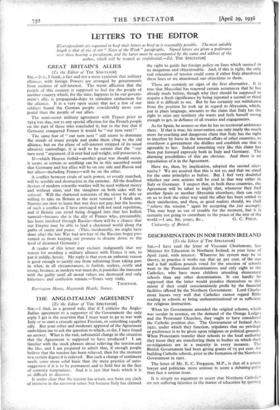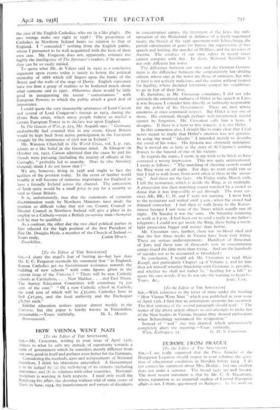DISCRIMINATION IN NORTHERN IRELAND [To the Editor of THE SPECTATOR]
Sta,—I have read the letter of Viscount Charlemont, late Minister for Education in Northern Ireland, in your issue of April 22nd, with interest. Whatever his system may be in theory, in practice it works out that 92 per cent, of the one and a half million pounds voted for the erection of schools went to the Protestant denominations and only eight to the Catholics, who have more children attending elementary schools than any other denomination. It can hardly be
supposed that the latter would penalise themselves to this extent if they could conscientiously profit by the financial
facilities offered by the Northern Government. Lord Cherie- mont knows very well that Catholics cannot regard Bible reading in schools as being undenominational or as sufficient for religious instruction.
When his Government amended the original scheme, which was secular in essence, on the demand of the Orange Lodges and the Protestant Churches, they ought to have considered the Catholic position also. The Government of Ireland Act, 1920, under which they function, stipulates that no privilege or preference is to be given upon religious or politiCal grounds. When Protestants transfer their schools to the local authority they know they are transferring them to bodies on which their co-religionists are in a majority in every instance. The British Government had been giving grants of 75 per cent. for building Catholic schools, prior to the formation of the Northern Government in 1921.
The letter of Mr. E. C. Ferguson, M.P., is that of a young lawyer and politician more anxious to score a debating-point than face a serious issue.
It is -simply no argument to assert that Northern Catholics are not suffering injustice in the nutter of education by quoting
the case of the English Catholics, who are in a like plight. Do two wrongs make one right in 1938? The proportion of Catholics in Northern Ireland bears no relation to that of England. I " concealed " nothing from the English public, whom I presumed to be well acquainted with the facts of their own case. Mr. Ferguson does not, apparently, estimate too highly the intelligence of The Spectator's readers, if he assumes they can be so easily misled.
To quote what Mr. de Valera said in 1920 as a conclusive argument upon events today is surely to betray the political mentality of 1688 which still lingers upon the banks of the Boyne and the walls of the siege of Derry. English statesmen have too firm a grasp of realities to be bothered much about what someone said in 1920. Otherwise there would be little good in inaugurating the recent " conversations " with European Powers, to which the public attach a good deal of importance.
I could quote the very treasonable utterances of Lord Carson and several of Lord Craigavon's friends in 1913, during the Home Rule crisis, which many people believe so misled a certain European Power as to declare war upon England.
In The Genesis of War, p. 215, Mr. Asquith says : "Germany undoubtedly had counted that in any event, Great Britain would be kept back from active participation in the European struggle by the imminence of civil war in Ireland."
Mr. Winston Churchill in The World Crisis, vol. I, p. 195, admits to a like belief in the German mind. At Glasgow on October 1st, 1912, Carson admitted that the cause he and his friends were pursuing (including the mutiny of officers at the Curragh), "probably led to anarchy. Does he (the Attorney General) think I do not know that ? "
We are, however, living in 1938 and ought to face the realities of the position today. In the event of further world trouble it will become of immense importance for England to have a friendly Ireland across the channel. The concession of Irish unity would be a small price to pay for a security so vital to Great Britain.
It is, unfortunately, true that the statements of sectarian discrimination made by Northern Ministers have made the position so difficult today that not one County Council or District Council in Northern Ireland will give a place in its employ to a Catholic—even a British ex-service man—however well he may be qualified.
As a contrast, the other day the two chief political parties in Eire selected for the high position of the first President of tire Dr. Douglas Hyde, a member of the Church of Ireland.—



























































 Previous page
Previous page